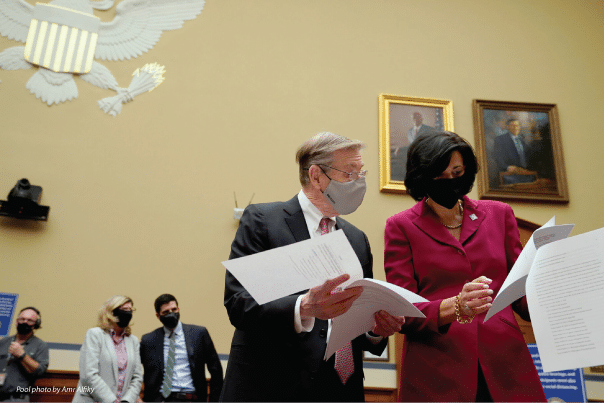Just How Many People In America Have Lost A Loved One?
The Centers for Disease Control and Prevention (CDC) is one of the nation’s most-trusted, science-based sources of data on public health in the United States. For more than 70 years, this government agency has been monitoring the nation’s health landscape and providing guidance to the public on how to prevent and respond to health threats. It collects myraids of data on national health trends, including mortality rates related to homicide, suicide, substance misuse, maternal mortality, accidents, and more. Yet, while it collects how we die, it does not collect who survives these deaths and what the implications are.
With concurrent mortality epidemics touching every neighborhood in America, millions of people have experienced the death of a family or friend, but exactly how many people are impacted? We don’t know. What adverse outcomes do people experience in the aftermath of death? We have to look to academia or to other international registries to better understand the ramifications of losing someone meaningful.
“We all know the saying, ‘what gets measured, gets done,’” says Evermore founder Joyal Mulheron. “Bereavement is a public health concern hiding in plain sight simply because we are not measuring the scale or impact that losing loved ones has on our society.”
For example, to understand how many people have been impacted by COVID-19, we can look at the findings from a research study conducted by Ashton Verdery of Pennsylvania State University, Emily Smith-Greenaway of the University of California at Los Angeles, and Rachel Margolis of the University of Western Ontario. They find that for every one COVID-19 death, approximately nine survivors were impacted by the loss of a grandparent, parent, sibling, spouse, or child. But the study’s authors suggest that this is actually a significant underestimate, and likely more individuals are impacted, on average, by a single death. We also know that family survivors are more at risk for poor physical health outcomes, premature death, and other adverse consequences that can alter their life course.
For COVID-19 alone, more than 9 million individuals lost a loved one to COVID-19, including an estimated 78,000 children who lost a parent. This indicates that a significant portion of the population has been impacted by not only loss and grief, but in many cases by the loss of income and health care benefits (if the deceased individual contributed to household earnings and held a job with insurance). This is why we need sound data collection — to provide a clear picture of the impact in order to shape a federal response.
In order to develop sound policies and practices for supporting loved ones after a death event, our nation requires consistent and reliable data on the prevalence and consequences of death and bereavement. We need to know how many people are impacted by different types of death epidemics so we can see a more accurate picture of the true impact.
“When we lose someone meaningful in our life, it can irrevocably alter our health and our social and economic stability for years, decades, and in some cases, impact our well-being for the rest of our lives,” says Mulheron. “The more we know, the more we can help children and families.”
Collecting statistics on bereaved children, parents, siblings, and spouses could help Americans better understand the associated outcomes and impacts, such as housing and food insecurity, health care coverage loss, educational hardship, incarceration, substance use, suicide attempts, and premature death. These statistics are also crucial in helping us better understand what can be done to support bereaved people.

TONI P. MILES, MD, PHD
In 2021, Evermore made legislative strides, using the U.S. budget process as a vehicle to advance CDC data collection. Using work piloted by Toni Miles, M.D., PhD, formerly of the University of Georgia, Evermore advocated for the inclusion of bereavement epidemiology in CDC’s Behavioral Risk Factor Surveillance Survey (BRFSS). BRFSS is the nation’s premier survey tool to collect data from 400,000 adults living in the 50 states, the District of Columbia, and three U.S. territories. It is the largest continuously conducted health survey in the world.
Dr. Miles’ work preceded the COVID-19 pandemic, but found that 45 percent of Georgians — or 3.7 million Georgian residents — were bereaved in the last two years. She found that bereavement disproportionately impacts African American families with 58 percent reporting a recent loss.
“Dr. Miles’ work is very important because it enables policymakers to narrow and focus solutions to help bereaved families,” says Mulheron. “For example, Dr. Miles’ preliminary evidence found that 53 percent of those with a recent loss were out of work. This demonstrates the need for more compassionate employer policies, but also the need for Congress to add death of a loved one as a qualifying event to the Family Medical Leave Act.”
Ultimately, the budget provision passed Congress, but with no funding for CDC to include bereavement as a measurement on BRFSS. In budgetary legislative language, Congress is encouraging CDC to collect bereavement data, but it is an unfunded mandate that CDC is not obligated to follow.
“Still, this is a legislative victory and CDC is beginning to pay attention to bereavement and its impact,” says Mulheron. “As a nation we are beginning to recognize that death is not simply a mental health issue. It creates vast uncertainty for an individual’s health, social, and economic well-being. We will continue to fight for America’s families. It’ll take time, but we will get there.”
Additional resources
Tracking the reach of COVID-19 kin loss with a bereavement multiplier applied to the United States, Ashton Verdery, PhD, Emily Smith-Greenaway, PhD, Rachel Margolis, PhD
Estimates and Projections of COVID-19 and Parental Death in the US, Rachel Kidman, PhD, Rachel Margolis, PhD, Ashton Verdery, PhD, Emily Smith-Greenaway, PhD

